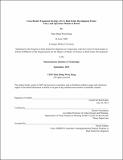Cross-border expansion strategy of U.S. real estate development firms : entry and operation models in Brazil
Author(s)
Kang, Dan (Dan Dong Woo)
DownloadFull printable version (3.865Mb)
Other Contributors
Massachusetts Institute of Technology. Center for Real Estate. Program in Real Estate Development.
Advisor
Dennis Frenchman.
Terms of use
Metadata
Show full item recordAbstract
Over the past several decades, technological advances, the spread of free-market ideology and the shifting of the economic center of the world have resulted in an incredible transformation of the world into a globalized, interdependent place. The term "globalization" has become an essential keyword associated with business in the modern world, creating great opportunities for U.S. firms to seek future growth potential in the global arena, especially in emerging markets that are undergoing rapid economic development. Although the real estate industry has achieved some level of globalization in general, the development sector is one area of a broad real estate industry that has yet to show significant strides in global expansion activities. The purpose of this study is to examine the current business landscape of U.S. real estate developers' globalization efforts and to create a qualitative analysis of why globalization works / does not work for real estate developers based in the U.S. The ultimate question the study asks and answers is what are the key strategies that U.S.-based real estate developers should use to develop real estate property in emerging markets (Brazil, in particular)? Brazil was extensively investigated as the topic of this research. The research discovered some development risks in Brazil associated with the high levels of bureaucracy, tenants' perception of the product and lack of market intermediaries. A number of American real estate development firms have successfully overcome these hurdles by forming strategic alliances with local partners and adequately responding to cultural and administrative distances between Brazil and the U.S.
Description
Thesis (S.M. in Real Estate Development)--Massachusetts Institute of Technology, Program in Real Estate Development in Conjunction with the Center for Real Estate, 2013. This electronic version was submitted by the student author. The certified thesis is available in the Institute Archives and Special Collections. Cataloged from student-submitted PDF version of thesis. Includes bibliographical references (pages 58-60).
Date issued
2013Department
Massachusetts Institute of Technology. Center for Real Estate. Program in Real Estate Development.; Massachusetts Institute of Technology. Center for Real EstatePublisher
Massachusetts Institute of Technology
Keywords
Center for Real Estate. Program in Real Estate Development.